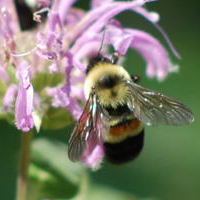As a beekeeper and someone who is around bees and beehives daily, I am often asked about the bee decline and one of the things I hear people mentioning that bees need help since they are endangered. I just wanted to shed some light and clarity on the topic.
Are honeybees endangered? No.
There are over 4,000 species of bees in North America and it was actually the Rusty Patched Bumblebee that was recently place on the endangered species list. This is not to say that we shouldn’t be concerned about the bumblebee, especially since the factors putting pressuring this species of bumblebee are the same that are causing the decline in our honey bees.
To learn more about the Rusty Patched Bumblebee check out this link.

(Rusty Patched Bumblebee)
Habitat loss, exposure to pesticides and limited genetic diversity are some of the key factors threatening this unique bumblebee. Habitat loss greatly affects the wild honey bee population as well (although there is less research done on wild honey bees than commercially kept bees) by limiting their foraging resources as well as potential locations for establishing new hives. Pesticides are a big problem for both wild honey bees and commercially kept bees. Bees that are used for commercial pollination are exposed to pesticides and only allowed to forage on a single pollen source at a time. The decline in bees that are kept commercially and CCD is pretty much common knowledge these days. This is largely due to the fact that there are huge financial losses for the beekeepers and potential for costs of produce to go up at grocery stores with the losses of commercially kept bees.
To sum it up, we need all of our pollinators and if one species of pollinating insect is endangered we should view this as an indicator that our pollinators need help! Anyone can help our native pollinators by building a native bee nest and planting flowers. Check out this link for tips on planting a bee friendly garden.